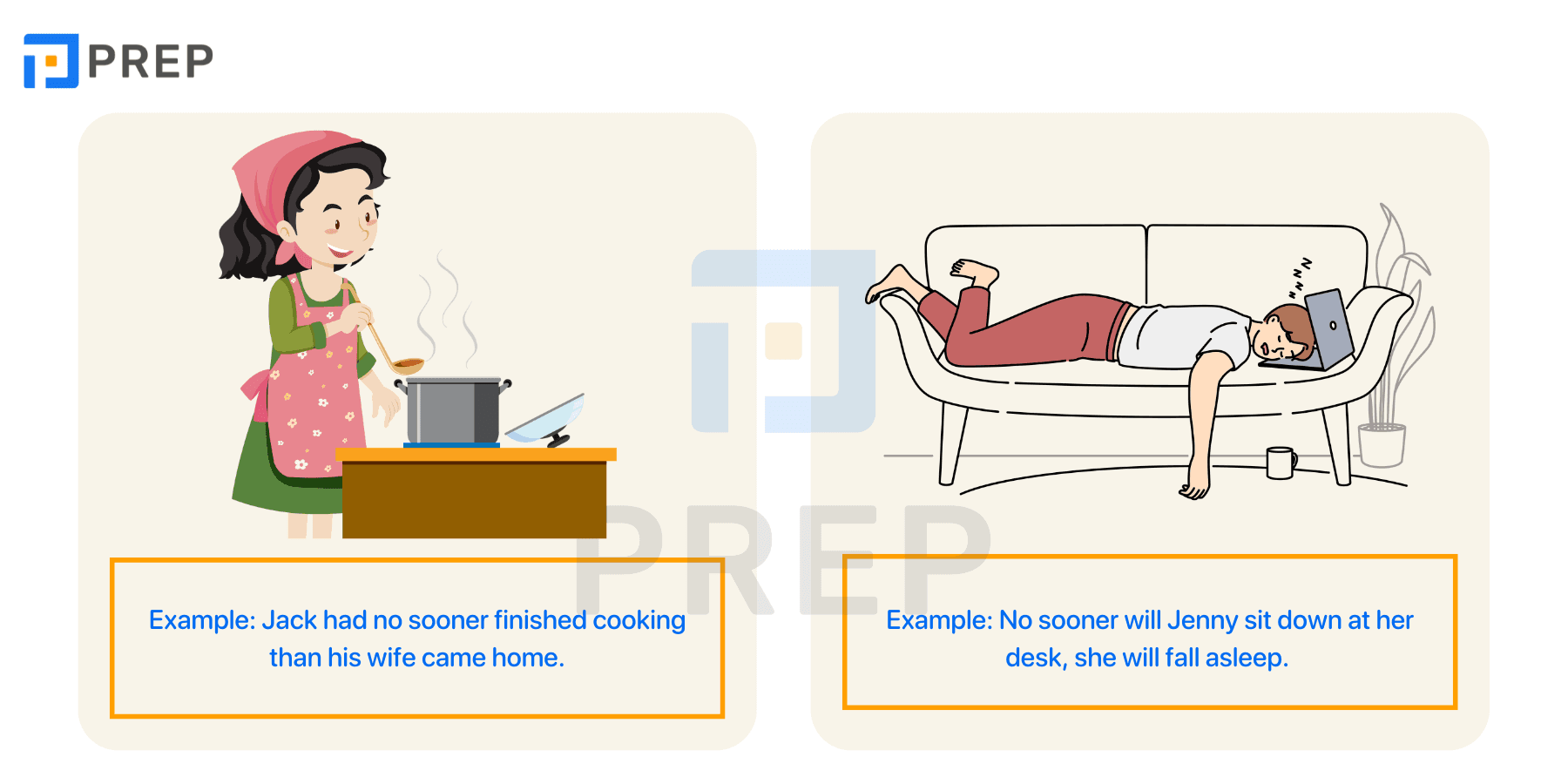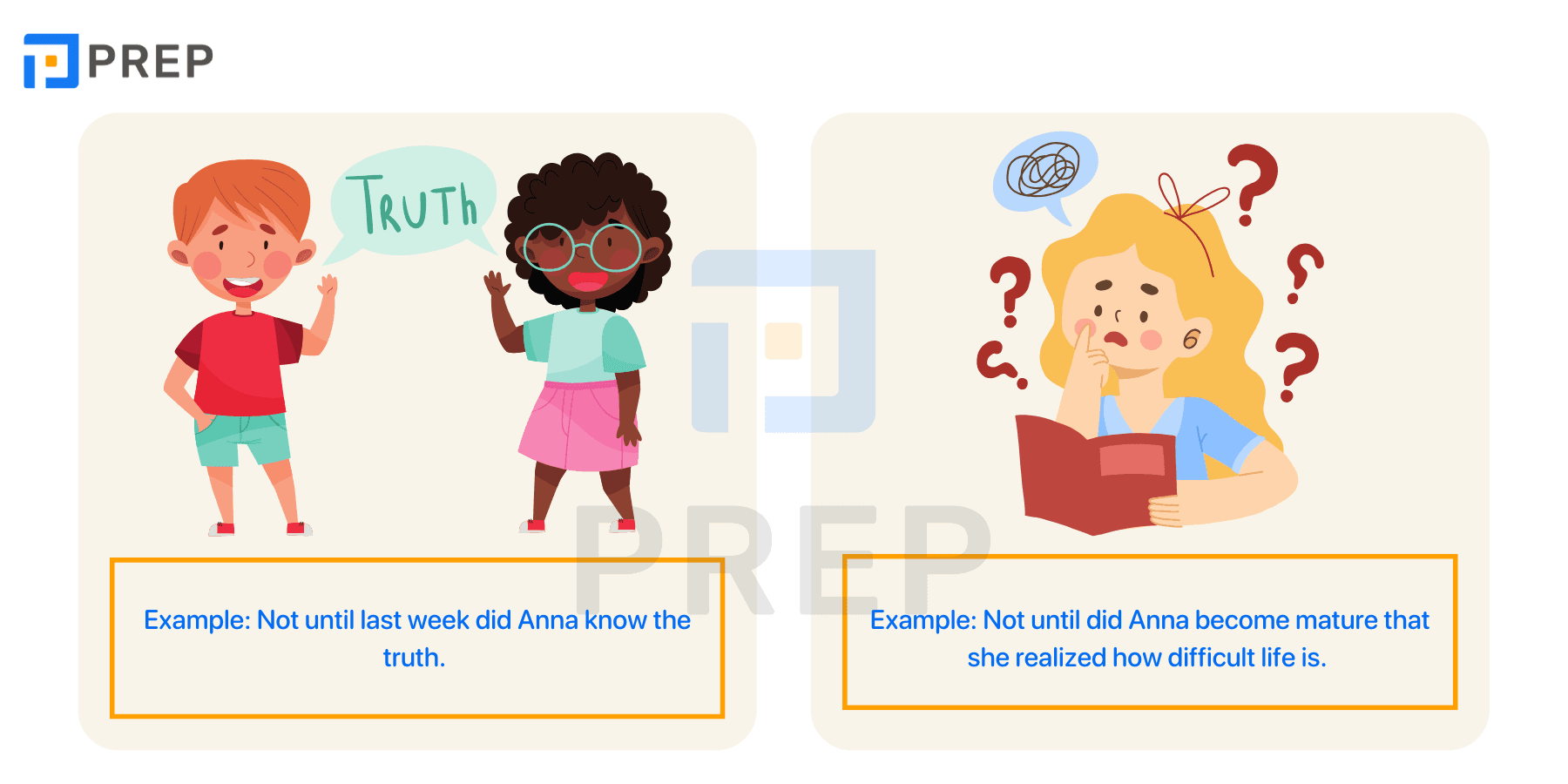What is No sooner? General knowledge about No sooner in English
No sooner is one of the common grammatical structures in English that frequently appears in exams and everyday conversations. Do you really understand how to accurately apply this structure for effective communication and to achieve high scores in real English tests? Let’s explore the general knowledge about No sooner in today’s article!

I. What is No sooner?
The No sooner meaning is to describe an action that occurs immediately after another action. When No sooner begins a clause, we apply the inversion formula. Following “No sooner,” an auxiliary verb is inverted to precede the subject, emphasizing the action being mentioned, while “than” begins the subsequent clause.
For example:
-
No sooner had Emily left the office than it started raining heavily.
-
No sooner had Clara appeared than an accident happened.
-
No sooner had John arrived than the party was over.
Some similar phrases/idioms to No sooner:
|
Phrases/idioms |
Example |
|
Simultaneously /ˌsaɪməlˈteɪniəsli/ |
Anna was eating a cake and drinking milk simultaneously. |
|
Consecutive /kənˈsekjətɪv/ |
John has had consecutive failures in business. |
|
Successively /səkˈsesɪvli/ |
Bella passed three exams successively in one month. |
|
All the while /ɔːl ðə waɪl/ |
All the while she was traveling in Singapore, Hana didn't eat any rice. |
|
In parallel /ɪn ˈpærəlel/ |
In parallel with Jane, Jack went out but arrived later. |
|
Hardly when /ˈhɑːrdli wɛn/ |
Hardly had the cake come out of the oven when I took a bite. |
|
Scarcely when /ˈskɛəsli wɛn/ |
Scarcely had I been scolded by my mother when I ran away. |
|
As soon as /æz suːn æz/ |
As soon as I got promoted, I was assigned a lot of work. |

II. Structure of No sooner sentences
1. Basic structure of No sooner…than
The general structure of No sooner than in a sentence is:
S + + auxiliary + No sooner + V + than + S + V
The No sooner than examples:
-
Bella had no sooner finished reading the book than the clock struck ten.
-
Jack had no sooner finished cooking than his wife came home.
2. No sooner in the past tense
No sooner is most commonly used in the past tense in English. So No sooner did or had? In this form, remember to use the past perfect tense for the clause containing “No sooner,” while the clause with “than” is in the simple past tense. Therefore, let’s explore the No sooner had and No sooner did sentences below!
Structure:
No sooner + had + S + V-ed/V3 + than + S + V-ed/V2
No sooner + did + S + V-infinitive + than + S + V-ed/V2
For example:
-
No sooner did I arrive home than it started to rain.
-
No sooner had I quit my current job than a new company contacted me for a position.
3. No sooner with will
No sooner with will is often used to express actions in the simple present and near future. In this usage, pay attention to place “will” immediately after “No sooner”
Structure:
No sooner + will + S + V + than + S + will + V
For example:
-
No sooner will he finish work, he will hurry to his date with his girlfriend.
-
No sooner will Jenny sit down at her desk, she will fall asleep.
4. Inverted structure of No sooner
Structure:
No sooner + had + S + V + than + S + V
For example:
-
No sooner had I arrived in Singapore than I tried the Singaporean frog.
-
No sooner had I known my university entrance exam results than I told my mother.
5. Notes of No sooner than usage in conversation
No sooner … than is typically used more in writing, as using it in speaking may sound unnatural. Instead, in conversation, you might use structures like:
-
Bella was on her way to Korea soon after she graduated.
-
Anna came back home after her boyfriend finished cooking dinner.

III. Distinguishing similar structures to No sooner
In addition to No sooner, there are several similar structures in English grammar. How can you accurately use these structures? Let’s explore the answers here!
1. No sooner and Hardly/Scarcely
|
Structure |
No sooner |
Hardly/Scarcely |
|
Similarities |
Both describe two events following each other. |
|
|
Differences |
No sooner goes with than No sooner + had + S + V + than + S + V |
Hardly/scarcely goes with when No sooner + had + S + V + when + S + V |
|
Example |
No sooner had he hung up the phone than he left. |
Hardly/Scarcely had he hung up the phone when he left. |

2. No sooner and As soon as
|
Structure |
No sooner |
As soon as |
|
Similarities |
Both describe two sequential events. |
|
|
Differences |
“No sooner” combines the past perfect and simple past tenses. |
“As soon as” has verbs in the clauses sharing the same tense. |
|
Example |
No sooner had the rain stopped than a rainbow appeared. |
As soon as the rain stopped, a rainbow appeared. |

IV. Distinguishing No sooner from other similar inversion structures
Here are some inversion structures that can easily be confused with No sooner. Be careful to use them correctly!
1. Not only
After “not only” and “but also,” the grammatical structures must be the same. Therefore, when using this structure, ensure you have a solid understanding of parallel structures to avoid grammatical errors.
Not only + S1 + but also + S2 + V
For example:
-
Not only Anna but also her sister likes to watch films.
-
Not only Peter but also his best friend is good at English.

2. Not until
The structure “Not until” is often used with time expressions to emphasize the timing of the action referred to in the following clause.
It was not … until that…
➡ Not until + … + auxiliary + S + V
For example:
-
It was not until last week that Bella knew the truth. ➡ Not until last week did Anna know the truth.
-
It was not until Clara became mature that she realized how difficult life is. ➡ Not until did Anna become mature that she realized how difficult life is.

V. Exercises on using No sooner
Here are some exercises to memorize the No sooner formula. Let’s practice with PREP!
Exercise 1: Rewrite the sentence using No sooner.
-
Linda opened the door. She fainted at once. (than)
-
David had hardly left the university when the lesson ended. (than)
-
No sooner had we approached the post office than the policeman stopped us. (As)
-
No sooner had Jessica arrived at the company than the leader noticed her. (Hardly)
-
Hardly had the performance ended when Bob came. (than)
Exercise 2: Choose the most appropriate answer.
1. Scarcely had Mary ______ the book report when Crystal came in.
-
finish
-
finishing
-
finished
-
to finished
2. No sooner______the talkshow will start tomorrow.
-
will the bell ring than
-
the bell will ring than
-
the bell will ring when
-
will the bell ring when
3. No sooner had our class arrived at the train station ______ the announcement started.
-
than
-
when
-
then
-
last
4. No sooner ______ than the competition started.
-
do Jenny arrive
-
does Jenny arrive
-
Jenny arrives
-
had Jenny arrived
Answer:
|
Exercise 1:
|
Exercise 2: 1.C - 2.A - 3.A - 4.D |
The above is a compilation of knowledge about No sooner that PREP has gathered for you. Apply this knowledge in various exercises to reinforce your understanding and avoid confusion with other structures. Follow and explore more interesting knowledge with PREP!

Hi I'm Chloe, and I am currently serving as an Product Content Administrator at Prep Education. With over five years of experience in independent online IELTS study and exam preparation, I am confident in my ability to support learners in achieving their highest possible scores.
Comment
Premium content
View allPersonalized roadmap
Most read












